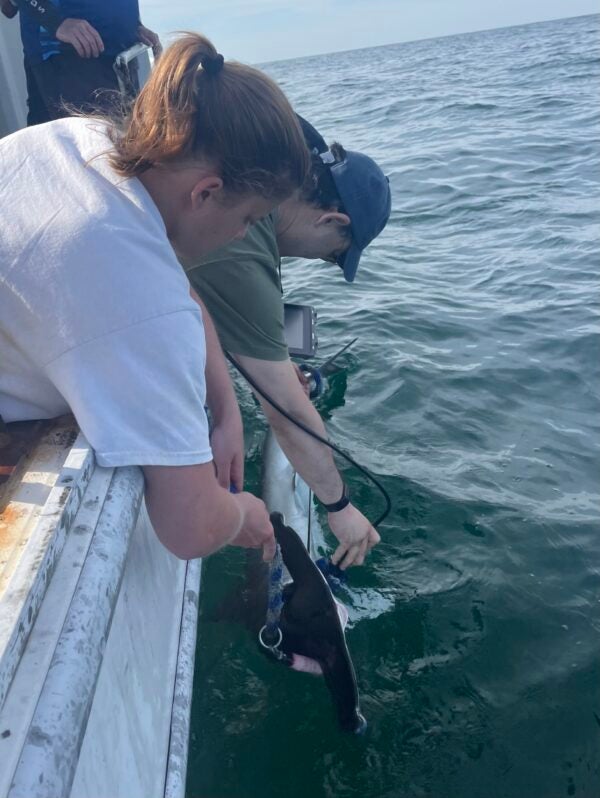Mary Brantley, a marine biology and marine affairs double major from Charlotte, North Carolina, went fishing for the first time this summer. The first fish she ever caught? A mako shark, known as the fastest shark in the ocean.
Brantley has been assisting with research led by Professor Bradley Wetherbee, an assistant professor of biology affectionately known as “the shark guy” around campus. For the past two semesters, she’s helped him study data on the movements of tiger sharks at French Frigate Shoals, a small atoll in the Northwestern Hawaiian Islands. This summer, as part of a Coastal and Environmental Fellowship, she was able to continue data analysis while also participating in field work with Wetherbee–the latter involving long days spent shark fishing in Narragansett Bay.
After catching bluefish–bait for the day’s work–the research team would park their boat and wait for sharks to bite. “We’d put snooters on the head and tail of the shark so we could lift it on board, which became my favorite job to do,” Brantley says. “Once it was on board, we’d pump water through the shark’s gills to keep it alive while simultaneously taking morphological measurements and tagging it. Finally, we’d slide the shark back into the water, reset the rods, and wait to repeat the process.”
“We caught a tiger shark,” she adds. “It was the first tiger shark Professor Wetherbee has caught in Rhode Island, and it was really cool to get the rare chance to see the shark I’ve been learning about all year.”
The days of her fellowship spent on data analysis were less eventful–wrangling of wild animals not included on the agenda–but proved to be equally valuable. She organized and analyzed data on seasonal and diel patterns of movement of tiger sharks in relation to prey availability. “I was surprised with how many ways I could analyze the data I was given,” she notes. “Every time I thought I was done with the project, we would find a different way to look at this set of data in order to best visualize it and have a better understanding of tiger shark movements.”
Wetherbee highlights the importance of offering undergraduate students hands-on research experience. “[Brantley] came to URI to take advantage of opportunities offered for students with her interests available at URI that are difficult to find at other institutions,” he says. “These fellowships give students an opportunity to immerse themselves in research and to learn many things that would never be learned in a classroom setting. The fellows have a chance to do what they’ve been dreaming about sometimes since they were little kids.”
As for her future career as a marine biologist, Brantley notes that gaining experience in the crucial components of both data analysis and field experience has been formative. “I’ve never had the chance to work with marine animals in such a capacity before, and it really solidified my decision to continue conducting field work in my future career. I currently want to continue fisheries research, particularly with sharks, and hopefully use that research to aid conservation policy,” she says. “I am now attempting to code for more analysis methods and because you can never truly predict how wild animals will act. I am constantly learning more from this project and this summer was a great start to any further research I want to pursue.”
Check out @URI_sharkresearch on Instagram for more!

